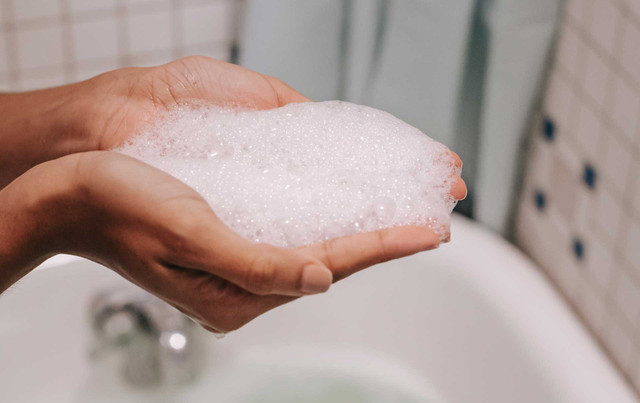
There are many myths surrounding showers and personal hygiene. Is showering every day bad for your skin? Do alternating showers combat cellulite? Does washing too often make your hair greasy? A dermatologist provides answers.
Dr. Stefanie Derendorf is a dermatologist at the dermatology clinic at St. Anna Platz in Munich’s Lehel district. In an interview with Utopia, she clears up myths and misunderstandings about personal hygiene. According to her, most personal care products are superfluous – and you should only soap five areas of your body when showering.
Dermatologist: Many people make mistakes in personal hygiene
Utopia: What we think we know about personal hygiene is not always true. Do many people come to your practice with false ideas about hygiene?
Stefanie Derendorf: Yes, that is often the case with patients with skin problems. Most of them don’t know that they are doing something wrong.
Utopia: And what are they doing wrong?
Derendorf: Young people often do too much personal hygiene, while older and male patients often do too little. Patients often just need to change their routine, and that is half the therapy.
Utopia: How much care is appropriate?
Derendorf: That depends on the individual.
Utopia: And what about showers?
Derendorf: Here I would recommend: Listen to your body. If you have a normal skin type, don’t do any heavy physical work or exercise, and don’t use sunscreen, two to three times a week is enough.
Showering daily is not unhealthy

Utopia: There are many myths surrounding hygiene. For example, showering every day is said to be bad for the skin. Is that true?
Derendorf: No, it is not unhealthy. People with normal skin can shower every day. If you do physical work, if you sweat or have dirt on your body, then it makes sense to wash on the same day. But if that is not the case, it is actually not necessary to shower every day. It also uses a lot of water.
Utopia: And people who don’t have normal skin type?
Derendorf: If you suffer from skin diseases, showering every day may not be recommended. For example, many people suffer from dry skin. They often have cracked, red patches and itching on their arms and legs. Showering every day is harmful for this skin type. Among other things, dry skin lacks fat, which is further removed with frequent showering. This dries out the skin even more.
Utopia: As an alternative to showering, you can also use a washcloth to clean your body. This has become popular again with the “non-bathing” trend and is touted as not only saving water, but also being healthy for the skin. Is that true?
Derendorf: Cleaning yourself daily with a washcloth instead of showering works just as well. It’s even better for dry skin.
Do contrast showers fight cellulite?
Utopia: Another myth that persists: Do contrast showers fight cellulite?
Derendorf: Many patients ask me what can be done about cellulite. This is when the fatty tissue pushes through the connective tissue septa, which leads to cellulite. The most effective measure against this is weight loss.
With contrast showers, you alternate between hot and cold showers. This is supposed to boost fat metabolism and stimulate blood circulation. This can certainly have a positive effect, including on fat burning. But there are no studies to prove this.
Only five areas of the body should be soaped

Utopia: Should you always soap your whole body when showering?
Derendorf: Soap removes dirt and greasy substances from the skin. Soaping makes sense in areas with a lot of sebaceous glands and areas that get a lot of dirt. These are the hands, armpits, feet, and the middle of the chest and back. These should be soaped regularly – but not daily – with a skin-neutral washing gel. For the rest of the body, water is sufficient.
Utopia: Are most shower gels skin-neutral?
Derendorf: Most washing lotions are alkaline. When we apply them to the skin, they dissolve fats – that’s the idea. But at the same time, we dissolve the acid mantle from the skin, which regulates moisture and protects against pathogens.
Utopia: What should you use then?
Derendorf: There are also washing lotions called syndets, which have a similar pH value to our skin. They are particularly recommended for people with dry skin because they do not attack the acid mantle. [Anmerkung der Redaktion: Allerdings fand Öko-Test 2022 bei einem Test in vielen Syndets PEG-Verbindungen und kritische Konservierungsstoffe.]
Utopia: What else should you pay particular attention to when buying washing lotions and shampoos – apart from the pH value?
Derendorf: From a dermatological point of view, it is best to avoid products that foam heavily. This is because the foam is created by surfactants, which dissolve fat from the skin and dry it out. If possible, also avoid fragrances, as these can cause contact allergies. When it comes to shampoos, products without silicones are often recommended, as these are considered to be harmful to the environment.
For skin care you only need three products
Utopia: It feels like there is a product for everything. It starts with shower gels – for relaxing, peeling, creams – and goes on to body lotions, shampoos, conditioners, hair masks and a whole host of facial care products. Do we really need that?
Derendorf: I have the feeling that the cosmetics industry today is making us believe that we have to use an insane amount of products. It used to be different – and back then there were no more or fewer skin problems. Social media is also contributing to this. It recommends long and complex skin care routines that are not even intended for people with skin diseases, but for normal skin types. Young people are given the feeling that they have to use numerous products to care for their skin. That can’t be good, it’s just marketing.
Utopia: Which products do you really need for skin care?
Derendorf: Young, healthy skin only needs a cleansing lotion, a make-up remover, sun protection – ideally combined with a day cream. That’s it. For acne, pigment spots or for anti-aging, you can add a serum or intensive care product if necessary.
Utopia: Facial cleansing products would therefore be superfluous. Can you simply wash your face while you shower?
Derendorf: I would recommend washing your face once a day – preferably in the evening, to wash off any dirt from the day. Water is completely sufficient, unless you have applied waterproof cosmetics or waterproof sunscreen. If you have severe acne, it can be a good idea to wash your face immediately after getting up. But yes, if you shower, you can simply wash your face with the shower water.
“Old wives’ tales” about washing hair
Utopia: Does washing your hair too often make it greasy faster?
Derendorf: That’s a myth. The sebaceous glands on the head do not work any more or less if you wash your hair more often. There is no study to prove this. But it is usually enough to wash your hair two to three times a week. I would not recommend washing less than that, because then the sebum content of the scalp can increase – and that can really make you sick.
Utopia: In what way?
Derendorf: Various factors play a role here. In winter, people often wear hats, and some wash their hair less often. In addition, the hat blocks the release of sweat and heat through the skin. Certain fungi can then multiply on the oily scalp. This leads to itching and flaking – and must be treated medically. Incidentally, in addition to hats, bicycle and motorcycle helmets can also have the same effect.
Utopia: Can you do without shampoo or shower gel altogether and just shower with water?
Derendorf: It’s a question of dosage. I think we can wash ourselves with just water much more often than we think. But I wouldn’t recommend doing without it completely – for scent reasons alone.
Note: This article was first published in 2023.
Read more on Techzle\.com:
- Is showering once a week enough? Editor does the shower test
- 11 common shower mistakes & how to avoid them
- Save water in the shower: Works with these 5 tips
** marked with ** or orange underlined Links to sources are partly affiliate links: If you buy here, you are actively supporting Techzle\.com, because we then receive a small part of the sales proceeds. .